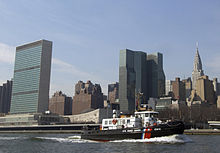UN inquiry finds mismanagement and failure of oversight
Thursday, September 8, 2005

The Independent Inquiry Committee's report on the overall management and oversight of the UN's Oil-for-Food Programme has concluded that the United Nations requires stronger executive leadership, thorough administrative reform, and more reliable controls and auditing.
The Programme included more than $103 billion in transactions (over $64 billion in oil sales and almost $39 billion for food).
Responsibility for what went wrong with the Programme is assigned to the UN Secretariat, members of the Security Council, its 661 Committee, and the Iraqi regime. In a change from past practice, the Security Council had retained substantial elements of administrative control through its 661 Committee. This caused neither the Secretariat leadership nor the Security Council to be in overall control.

There was reluctance of both the Secretary-General and the Deputy Secretary-General to recognize their own responsibility for the Programme's shortcomings and they failed to ensure that critical evidence was brought to the attention of the Security Council and the 661 Committee. They only made minimal efforts to address sanctions violations with Iraqi officials, and both failed to provide oversight of the Programme's Executive Director, Benon Sevan.
As the Programme expanded and continued, Saddam Hussein found ways and means of turning it to his own advantage, primarily through demands for surcharges and kickbacks from companies doing business with the Programme. For UN agencies, the work went beyond their core competencies of overseeing the distribution of humanitarian goods—from monitoring, planning, and consulting—to infrastructure rebuilding, thus multiplying problems. Nor was there much success in coordinating so large a program among UN Agencies accustomed to zealously defending their institutional autonomy.
There were Iraqi attempts to pass money to former Secretary-General Boutros Boutros-Ghali, principally through an Iraqi-American businessman, Samir Vincent, and a Korean lobbyist, Tongsun Park. The Committee has determined that well over $1 million was paid to Mr. Vincent and Mr. Park. However, the Committee has not found evidence that Secretary-General Boutros-Ghali received or agreed to receive monies from Mr. Park and Mr. Vincent.
The report recommended better oversight and management, financial disclosure by more UN staff, and that UN agencies should return up to $50 million in excess compensation secured as a result of work performed under Security Council Resolution 1483.
The Committee's Chairman, Paul A Volcker, stated, "The inescapable conclusion from the Committee's work is that the United Nations Organization needs thoroughgoing reform—and it needs it urgently. What is important—what has been recognized by one investigation after another—is that real change must take place, and change over a wide area. Clear benchmarks for measuring progress must be set. The General Assembly should insist, in its forthcoming meeting, that key reforms be put in place no later than the time of its regular meeting in 2006. To settle for less, to permit delay and dilution, would be to invite failure. It would, in reality, further erode public support, undercut effectiveness, and dishonor the ideals upon which the United Nations is built."
He added, "Before concluding its work, the Committee also intends a more comprehensive listing of firms participating in the Programme, either in the purchase of oil or the sale of humanitarian goods, as well as a more detailed analysis of the manner in which Iraq and its vendors and oil purchasers unlawfully manipulated the Programme."
Related news
edit- UN IIC report faults former "Oil-for-Food" director
- UN board supported Saddam Hussein's regime, says Iraq's ambassador
- UN troops accused of rape in Congo; UN staff suspended due to Iraq Oil-for-Food corruption
- UN dismisses first official over oil-for-food scandal
- Oil for food scandal: UN releases third report
Sources
edit- "THE MANAGEMENT OF THE UNITED NATIONS OIL-FOR-FOOD PROGRAMME" — Independent Inquiry Committee, September 7, 2005
| The text of this article has been released into the public domain. In the event that this is not legally possible, this article may be used for any purpose, without any condition, unless such conditions are required by law. This applies worldwide. Copyright terms on images, however, may vary, so please check individual image pages prior to duplication. Please note that this only applies to Wikinews content created prior to September 25, 2005. All content created after that date is released under a Creative Commons license which is mentioned at the bottom of each article. This is currently the Creative Commons Attribution 2.5 License. |